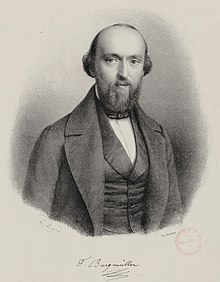Friedrich Burgmüller

Johann Friedrich Franz Burgmüller, generally known as Friedrich Burgmuller (4 December 1806 – 13 February 1874) was a German pianist and composer[1] during the Romantic period. He is perhaps best known for his three collections of children's etudes (or "teaching pieces") for the piano, particularly his Op. 100 "25 Études faciles et progressives" (25 Easy and Progressive Studies) for early intermediate students. The other two collections, for more advanced students, were Op. 105 and 109.
Life
[edit]Friedrich Burgmüller was born in Ratisbon (at that time part of the Principality of Regensburg, Confederation of the Rhine).[1] His father Friedrich August Burgmüller and his younger brother Norbert Burgmüller were also composers. His mother was pianist and singer Therese von Zandt.
He moved to Kassel in 1829 to study with Ludwig Spohr and Moritz Hauptmann.[1] There he appeared as a pianist for his first concert, January 14, 1830.[1]
Burgmüller moved to Paris in 1832 (at age 26 ),[1] where he stayed until his death. Norbert Burgmüller, his brother, made plans to join him in Paris, in 1835. However, he drowned in a spa in Aachen during an epileptic seizure a year later. In Paris, Burgmüller adopted Parisian music and developed his trademark (light) style of playing. He wrote many pieces of salon music for the piano and published several albums. Burgmüller also went on to compose piano études intended for children. He died in Paris on February 13, 1874.
Works
[edit]Burgmüller composed piano pieces, waltzes, nocturnes, polonaises and two ballets. His Peasant Pas de Deux was added to Adolphe Adam's ballet Giselle for its 1841 premiere. This music was originally titled Souvenirs de Ratisbonne.
Ballets
[edit]- La Péri
- Lady Harriet
With opus numbers
[edit]- 6 Mélodies gracieuses de Bellini, Op. 26
- Souvenir de Bellini, Op. 27
- Souvenir de Schönbrunn, Op. 32
- La Cachucha, Op. 36
- Murmures du Rhone, Op. 66
- Corbeille de roses, Op. 68
- Fleurs mélodiques, Op. 82
- Fantaisie brillante sur "Ernani" de Verdi, Op. 92
- Blaue Äuglein, Op. 93
- Les Étincelles, Op. 97
- 25 Études faciles et progressives, Op. 100
- 12 Études, Op. 105
- 18 Études, Op. 109
Without opus numbers
[edit]- L'Ange consolateur
- Ay Chiquita
- 3 Nocturnes, for cello and guitar
- Le Pardon de Ploërmel
- La Péri
- Souvenirs de Londres
- Ballade
References
[edit]External links
[edit]- Free scores by Burgmüller at the International Music Score Library Project (IMSLP)
- Werke von und über Friedrich Burgmüller in the German National Library catalogue
- Free scores Mutopia Project
- Link to Recording of the Opus 100 Etudes at the Piano Society Website Archived 2012-03-14 at the Wayback Machine
- Description of the Opus 100 Etudes by Noriaki Nomoto Archived 2011-09-27 at the Wayback Machine
- "Etudes op. 100 von Friedrich Burgmüller, pianoforte Pleyel". YouTube. 7 December 2012. Archived from the original on 2021-12-13. Retrieved 2 June 2013.
- "Etude op. 100 No 24 (l´hirondelle/ die Schwalbe/ the swallow) of Friedrich Burgmüller". YouTube. 28 March 2021. Archived from the original on 2021-12-13. Retrieved 30 March 2021.
| International | |
|---|---|
| National | |
| Academics | |
| Artists | |
| People | |
| Other | |
Text is available under the CC BY-SA 4.0 license; additional terms may apply.
Images, videos and audio are available under their respective licenses.

